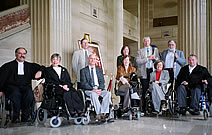Act Now

Empower U: Learn to Access Your Disability Rights Training on Canadian Human Rights, the Convention on the Rights of Persons with Disabilities (CRPD) and its Optional Protocol (OP) training aims to increase awareness of how to address discrimination using more familiar Canadian human rights laws such as Human Rights Codes and the newer international Convention on the Rights of Persons with Disabilities (CRPD). This is training for persons with disabilities by persons with disabilities. The training is part of a project funded by Employment and Social Development Canada and implemented by the Council of Canadians with Disabilities (CCD) in collaboration with Canadian Multicultural Disability Centre Inc. (CMDCI), Citizens With Disabilities – Ontario (CWDO), Manitoba League of Persons with Disabilities (MLPD) and National Educational Association of Disabled Students (NEADS). Read more.
Sign Up for our monthly digest
A monthly newsletter from CCD about what is happening in the community
Canadians With Disabilities Celebrate Supreme Court Decision
Related Documents
December 14, 2018
VIA RAIL SELECTS SIEMENS CANADA TO REPLACE ITS QUÉBEC-WINDSOR CORRIDOR FLEET
January 10, 2008
Reaction to Landmark Canadian Transportation Agency Decision: Disabled Canadians Jubilant to Have Transport Barrier Removed
May 17, 2006
Supreme Court of Canada to Rule on Access Rights of Persons with Disabilities
For Immediate Release
March 23, 2007
Today, the Supreme Court of Canada overturned a decision of the Federal Court of Appeal that allowed VIA Rail to run inaccessible passenger rail cars with impunity. The Court sent a clear message to VIA Rail, and indeed all Canadians, that service inaccessible to Canadians with disabilities will not be tolerated. Canadians with disabilities view this decision as a victory for accessible transportation in Canada. This was a David and Goliath like battle, where people with disabilities waged a protracted legal battle against VIA, a crown corporation which seemed determined to keep inaccessible passenger rail cars in service. Ultimately, the protection afforded by the Charter of Rights and Freedoms resulted in the Supreme Court taking a strong stand for a rail service usable by both people with and without disabilities.
Unlike VIA Rail, the Supreme Court of Canada, like the disability community, has been convinced that a universal, rather than a segregated, approach to service design is what ultimately will serve Canada the best. With a universal approach, services and products are designed in a manner that they can be used by people with the widest range of functional abilities. The impact of a universal design approach is less exclusion, fewer people being left behind, more participation and more opportunity for everyone.
The Renaissance cars, at issue in this case, were bought by VIA at bargain basement prices because they would not have been allowed on the tracks in the United States, Australia or Europe due to their poor design. The Canadian Transportation Agency (CTA) found that the trains failed to measure up in the following respects: no accessible washrooms in the coach car, the wheelchair tie-down only accommodated a child's wheelchair, the doorways are too narrow, there is insufficient space for a service animal, the so-called accessible suite is in fact inaccessible. The Supreme Court has saved the day and in effect had the courage to say-the emperor is wearing no clothes. Despite the $130 million of taxpayer dollars that has been spent by VIA Rail, the Supreme Court has had the courage to say VIA got it wrong with these cars and must do what is necessary to correct the problem. Unlike the Federal Court of Appeal, the Supreme Court was not willing to accept a rail service where people with disabilities could only travel on the days the accessible cars were in service. Analyzing this problem with an equality rights lens, the Supreme Court of Canada determined that the type of service offered by VIA Rail was counter to the commitments made to people with disabilities in the Charter of Rights and Freedoms.
When then Minister of Transport David Collenette made the announcement that VIA Rail would be receiving $400 million from the Federal government, he promised that any new rolling stock would be accessible to Canadians with disabilities. The Supreme Court's decision will make this promise come true for Canadians with disabilities.
This case has been a long and arduous journey for the disability community. It has expended a great deal of time and resources. While the outcome is all that we have dreamed of, we are asking the Federal Government to take the necessary regulatory action to prevent a similar boondoggle in the future. The disability community is seeking a regulatory framework, similar to what exists in the US, that would prevent inaccessible transportation equipment from ever being purchased or put into operation in Canada. Canadians with disabilities know as well as anyone the scarcity of resources for needed services and infrastructure. It is our objective that when resources are expended that they are being used in a manner that will benefit all Canadians.
-30-
For More Information Contact:
Ms. Pat Danforth Chair of CCD's Transportation Committee - (250)208-6720
Mr. David Baker Legal Counsel - cell: (647)234-0040
Ms. Marie White Chairperson of CCD - (709)739-8233
Ms. Sarah Godwin Legal Counsel - office: (416)533-0040 ext. 260
Mr. Laurie Beachell CCD National Coordinator - office: (204)947-0303, cell (204)981-6179
Mr. Claredon Robicheau Member CCD Transport Committee - (902)769-2474 Bilingual

CCD wins VIA Rail case at the Supreme Court of Canada on March 23, 2007.
